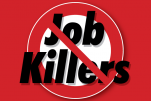Opposition from a California Chamber of Commerce-led coalition of groups has stopped a job killer bill that would have impeded housing construction and harmed the state’s economic recovery.
SB 950 (Jackson; D-Santa Barbara) sought to expand existing requirements of the California Environmental Quality Act (CEQA) by adding costly new mandates that would have burdened local agencies, added substantial time and costs to the CEQA process, and provided project opponents with new legal arguments to delay or block housing and other projects.
Testifying via telephone to the Senate Environmental Quality Committee, CalChamber Policy Advocate Adam Regele pointed out why SB 950 is a CalChamber job killer.
Not Balanced
Opposition from developers, unions and others “highlight the fundamental flaws of this bill,” Regele said, refuting the supporters’ claim that the proposal is balanced.
The bill was not the result of a process involving entities that represent the tens of thousands of stakeholders affected by CEQA on a daily basis, Regele asserted.
Instead, he commented, the language in SB 950 is the result of a well-intentioned but small group of CEQA practitioners hand-selected by the bill’s sponsors, and the only two developer-side participants ultimately resigned from the effort.
A bill of the magnitude of SB 950, substantially affecting all significant land use development in California, including and especially housing, should be developed through a robust stakeholder process, in a full legislative session, with multiple committee hearings that fully flesh out every change contemplated, he said.
“SB 950 is the exact opposite of what California needs right now,” he continued. The bill creates new costly burdens on lead agencies whose budgets are already underwater; increases time, costs and litigation for housing in California; overrules a California Supreme Court decision with implications for virtually all ballot initiatives; revises the original legislative intent of CEQA; does not fix the problems caused by “late hit document dumps” (when a project’s opponents file extensive opposition arguments toward the end of the public comment process, sometimes as late as the final day of hearings); and removes bond protection for moderate-income housing projects when the state’s middle class needs such housing more than ever.
Moving the bill out of the policy committee when there is no ability for all stakeholders to participate in developing the legislation is “highly inappropriate,” Regele said.
Senator Jerry Hill (D-San Mateo), a member of the committee, noted that the opposition to SB 950 “is coming from all sides” and “I can’t vote for it…I’m not seeing the reform that we’re all looking for.”
Key Vote
SB 950 fell short of votes to pass Senate Environmental Quality on May 29.
Ayes: Allen (D-Santa Monica), McGuire (D-Healdsburg), Wieckowski (D-Fremont).
Noes: Dahle (R-Bieber), Hill (D-San Mateo).
No vote recorded: Bates (R-Laguna Niguel), Hertzberg (D-Van Nuys).


